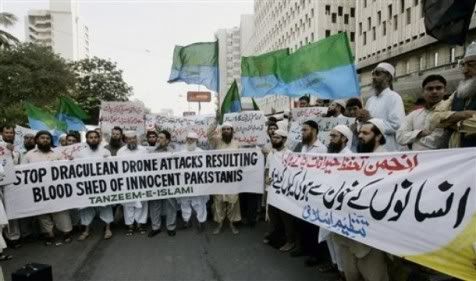The recent visit to Pakistan by the U.S Special Envoy Richard Holbrooke and Admiral Mike Mullen highlighted the growing differences between Pakistan and the United States on how to tackle the threat of Pakistani Taliban. At another level, their visit also signified an emerging consensus between Pakistan’s political leadership and security establishment that it can not afford to give in to the U.S. demands and need to chart a different course.

As a recent Dawn editorial noted, the visiting U.S. team was taken aback by the tone of Pakistani officials. Instead of arm-twisting Pakistan into agreeing to joint military operations in the tribal areas, they were confronted with a barrage of criticism and the visit ended with a rare and public acknowledgment of the differences between the two sides. While the PML-N chief Nawaz Sharif has been forceful in his opposition to these attacks for quite some time, it appears that the Prime Minister Gilani, President Zardari and the COAS Gen. Kiyani has finally thrown their weight behind this argument. Also a recent report from the bipartisan National Security committee condemned such attacks in the “strongest possible manner”.
Ironically its the Americans that deserve most of the “credit” for causing this convergence of thinking in Pakistan. A sustained campaign of charges in the U.S. press against the ISI for its alleged links with militants led by the senior U.S. Generals coupled with the threat of an expansion in drone attacks to cover Baluchistan and settled parts of Pakistan has finally convinced the national leaders to come out against the U.S. plans. Pakistan is also frustrated at the United States for its failure to make Pakistan’s strategic interests in Afghanistan a part of its new strategy for the region.

While it is too early to know if Pakistan can put up enough resistance to stop these attacks by unmanned aircrafts, it is good to see the change in nation’s attitude. Sovereignty is something that you either use or loose and in the case of Pakistan, we have opted for the later for the past 8 years. No one can deny the emerging threat of Taliban emanating from Pakistan’s tribal belt yet no sovereign country can allow such attacks by a foreign power. The western media often cites the killing of high-level Taliban and Al-Qaeda leaders to justify such tactics but they often fail to recognize the impact of such attacks at the strategic level: in addition to the backlash caused by the civilian casualties, these attacks put Pakistan government and army in an impossible situation that they can’t possibly cope with. They have also caused the Taliban to move eastwards into the more settled areas where such attacks are not possible due to population density. A recent report in the Foreign policy magazine summarized the situation as follows:
The US administration justified the drone attacks by claiming it would deny the militants a ‘safe haven’ in Pakistan.‘This line of argument sounds persuasive, but it falls apart on closer examination. For starters, it is not clear that al Qaeda requires a safe haven to do damage, especially since the original organisation has metastasised into smaller groups of sympathisers.’
The magazine pointed out that only a large-scale invasion could eliminate al Qaeda from the region but such an invasion was impossible and therefore there was little reason to continue the drone attacks.
‘US military strikes in Pakistan —even limited ones —tend to undermine the Pakistani government and increase the risk that Pakistan will become a failed state,’ the report noted.



















































What is the logic behind stoping drone strikes. These are targetted attacks. The intel behind them is established by the US and Pakistan. Every report about the drone strikes carried by Dawn and other papers mentions the number of alqaeda and taliban killed. I am not getting the problem.
The aerial attack is the only thing the taliban have no defence against. That is what irks them and their sympathizers. And they are very effective. The alqaeda are getting hit without warning from the air. Troops on the ground are always going to be walking into ambushes when every second kid with a cell phone is a taliban scout. The british quelled the rebellions by using airpower. The small airfields in NWFP and FATA are from that era. And then as now the only way to control this is to use air power and force these people into a collective responsibility regime.
The recruitment will go on just as aggressively even if the drone attacks were to stop. To the average talib prospect, anyone against the taliban is a kafir. That includes the Pakistan army, and even includes their fellow tribesman in the army or levies/police. There can be no appeasement or letup.
Drone attacks should continue as long as Pakistan is unable to establish its writ in tribal areas + Malakand Division. If Taliban Shura operates from Quetta, then Quetta should also be surgically targeted.
Pakistan should forget that if they withdraw from some region, external forces would turn away from that region.
The more and more I think about resistance to drone attack the more strongly I feel that Taliban and other terrorists organizations are not only supported by a majority of Pakistani nationals but also by Pakistan Govt. Today it was reported in pakobserver.net that President Zardari has sought international support against terrorism and has said that “Terrorism is more serious than Recession”, well that seems to be very welcoming to hear, but if one looks at the ground realities, the actions and words of the Pakistan Govt are directionally opposite. Why else will you see Swat deal signed? Why else will you see the Red Mosque Cleric Maulana Abdul Aziz being release,
IT is clear that the drones are NOT our biggest problem, the religious extremists are. But there is no way we can fight the extremists until we have done something about the drones. They only help the extremists in selling their message.
Big difference between civil gov’t/society and Taliban version of Sharia is understanding that ‘Answer to violence is not violence’. Mullah trained jihadees teenagers don’t know and have no means of knowing what is life with peace and tolerance that concept is western luxury and portrayed ‘evil’. Pakistan is going towards the dark ages of Zia regime and Zardaari is giving it on a silver platter. Drone attack is only a stepping stone. But ahhh….. lets keep the score correct on who is selling our country’s soul……that is our crap leadership Altaaf’s, Sharif’s and Zardaaris who we elected ourselves :) except mullah….mullah lost widely in the last election but making a big come back. I just realized that I don’t have a solution to this mess…….even education can’t save a nation which is on rapid path to self-distruction. Well, perhaps give a drink and a prostitute to all 72 virgin lover mullahs, things might come to normal.